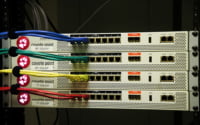Debian vs Ubuntu: A Comprehensive Comparison for Server and Desktop Users

Have you ever found yourself scratching your head, trying to decide between Debian and Ubuntu for your next server or desktop setup? You’re not alone. With their shared history and common features, it’s no wonder that many Linux users struggle to choose between these two popular distributions.
At IOFLOOD, we see strong demand for both Linux distributions on customers dedicated servers. Because of this, our technicians get good practice in learning the implementation details and fine differences between these two operating systems. In this blog post, we’ll dive deep into the similarities and differences between Debian and Ubuntu, providing you with a comprehensive comparison that will help you make an informed decision for your specific needs.
TL;DR Is Ubuntu Debian?
No, Ubuntu and Debian are separate Linux distributions. Ubuntu was indeed created using Debian as its starting point. Like any child and parent, there are similarities, but clear and important differences.
Read on to learn more about the subtle and substantial differences between Debian vs Ubuntu.
Table of Contents
Background and Origins of Debian and Ubuntu
Let’s start with a little background on both distributions. Debian, founded by Ian Murdock in 1993, is an independent Linux distribution known for its stability, extensive software repositories, and strong commitment to free software principles. Ubuntu, on the other hand, was created in when Mark Shuttleworth, a South African entrepreneur, founded Canonical and launched Ubuntu. Ubuntu is based on Debian, but its creators aimed to make it more user-friendly and accessible to a broader audience. As a result, Ubuntu is often considered a “derived distribution,” while Debian remains an “independent distribution.”
The relationship between Debian and Ubuntu can be compared to a parent and child, with Debian being the parent and Ubuntu being the child. Ubuntu inherits many characteristics from Debian, such as its package management system apt and core software components. However, Ubuntu has grown and developed its own unique features and goals over time.
Key Differences between Debian and Ubuntu
Updates and testing
One of the main differences between Debian and Ubuntu lies in their release cycles and software availability. Debian follows a slower release cycle, focusing on stability and thoroughly tested software. This means that Debian users may not always have access to the latest software versions, but they can trust that the software in Debian’s repositories is stable and reliable.
Ubuntu, on the other hand, has a faster release cycle, which means that users can enjoy newer software versions more quickly. However, this may come at the cost of occasional instability or compatibility issues. Additionally, while both Debian and Ubuntu offer extensive software repositories, Ubuntu tends to have a broader selection of software, including some proprietary applications that may not be available in Debian’s repositories.
Software support
Ubuntu’s more frequent updates and newer software versions make it better suited for bleeding edge use cases, such as fast-moving blockchain projects that require the latest kernel features and software versions. While implementation and stability problems can be common with bleeding edge software, Ubuntu is often the only viable option for these projects.
Meanwhile, some software is exclusive to Debian, such as the popular Proxmox VPS control panel platform. This makes sense because a foundational hosting platform like a VPS control panel needs stability and reliability. It’s less important to support bleeding edge software, which you can always run inside of the actual virtual machines the control panel manages.
Proxmox is based on Debian. It can either be installed standalone, where the provided installer is a modified version of Debian, or installed on top of an existing Debian OS installation. This foundational software is Debian-only and can be a compelling reason to choose Debian over Ubuntu.
Installation and hardware support
Debian’s installation and hardware compatibility are characterized by a highly customizable, hands-on approach. This caters to seasoned users who want to tailor their systems to their liking but can be overwhelming for novices. On the other hand, Ubuntu offers a more simplified, approachable installation experience that’s perfect for those new to the platform. Additionally, Ubuntu typically delivers superior hardware support right off the bat, due in part to the integration of proprietary drivers and firmware.
Desktop Environment Choices and Gaming
Both Debian and Ubuntu come with distinct default desktop environments and an array of alternative options. Debian features GNOME as its primary desktop environment, whereas Ubuntu presents a customized GNOME variant known as Ubuntu Desktop. Nevertheless, users have the flexibility to select from other desktop environments, including KDE, XFCE, and MATE, depending on their personal preferences.
When it comes to gaming on Linux, both Debian and Ubuntu have made significant strides in recent years. Hardware compatibility has improved, thanks in part to better support for proprietary drivers, which can be crucial for gaming performance. Projects like Steam and Proton have also played a major role in making gaming on Linux more accessible, benefiting both Debian and Ubuntu users alike.
Despite the strides both options have made, for gaming on Linux, I would choose Ubuntu over Debian. As game software is fast moving, with show stopping bugs being common, it can be very helpful to upgrade necessary libraries with the latest versions as soon as they come out. This support for the very latest packages is something you’ll find in Ubuntu far more so than Debian.
Performance, Community, and Support
Performance in Debian and Ubuntu can be influenced by factors such as hardware compatibility, software versions, and system configuration. Generally speaking, both distributions perform well on a wide range of hardware, with Ubuntu often having an edge in terms of out-of-the-box compatibility and ease of setup. For performance in terms of raw speed, for most use cases there will be little difference. If a major breakthrough occurs in the performance of a specific library, Ubuntu will see that first, but for most software applications, they are already fairly mature and these updates will make little difference.
The community dynamics and support options for Debian and Ubuntu also differ. Debian boasts a large, active community that values open-source principles and technical expertise. Users can find help through mailing lists, forums, and IRC channels, as well as extensive documentation. Ubuntu’s community, while also large and active, is generally considered more beginner-friendly, with a wealth of resources geared towards new users. Canonical, the company behind Ubuntu, also offers professional support services for both desktop and server users. So the support you can receive really depends upon whether your use case fits the target audience, and whether you’re interested in paid support.
Debian vs Ubuntu for Servers
When it comes to choosing between Debian and Ubuntu for server use, there are specific considerations to take into account. Stability is a crucial factor for many server environments, and Debian’s focus on thoroughly tested software can be a significant advantage in this regard. However, some users may prefer the more frequent updates and newer software versions available in Ubuntu.
Support options are another important consideration for server environments. While both Debian and Ubuntu offer community support, Ubuntu has the added benefit of professional support services from Canonical. This can be a significant factor for businesses and organizations that require reliable, expert assistance for their server deployments.
Specific use cases favoring Debian and Ubuntu
We had already mentioned that blockchain applications have much better support on Ubuntu, while Proxmox control panel uses Debian. Here are two more scenarios where your actual use case will lean you heavily towards one distribution over the other:
If you’re interested in machine learning or artificial intelligence, you’d be best off choosing Ubuntu. This is a fast moving space where you often need the latest libraries to run the most popular software. As well, performance requirements can be extreme, and the hardware and software in machine learning is rapidly evolving. Because of this, you can expect these newer libraries to perform better, and allow the most robust support for the latest GPUs and drivers. This is very much a case where Ubuntu’s more frequent updates and access to newer software would be essential to ensure the best possible performance and compatibility.
On the other hand, a specific example where you might feel compelled to use Debian would be when setting up a server environment for a mission-critical application that requires a proven track record of stability and reliability. For instance, an organization managing sensitive financial data may prioritize stability over cutting-edge features, making Debian a more suitable choice for their server needs.
Conclusion
Both Debian and Ubuntu are excellent Linux distributions with their own unique strengths and weaknesses. If you’ve used one, you’ll be at home with the other, as they do use the same package manager and many of the same system tools. Debian’s focus on stability, commitment to open-source principles, and customizable installation process make it a popular choice for advanced users and server deployments. Ubuntu, with its user-friendly installation process, more frequent updates, and broader software availability, is often considered more approachable for new users, desktop use, or server use cases in fast moving industries like machine learning or blockchain.
Ultimately, the best choice between Debian and Ubuntu will depend on your specific needs and preferences. We encourage you to try both distributions and decide which one is the best fit for you. And remember, the Linux community is always here to help you along the way!
Do you love servers?
We do! Whether you go with Debian, Ubuntu, or end up using CentOS or one of it’s alternatives, IOFLOOD is perfectly equipped to help you with a high performance dedicated server well suited to the task. Email us at sales[at]ioflood.com or visit our website at https://ioflood.com to learn more about what dedicated server options would be best for your use case.


